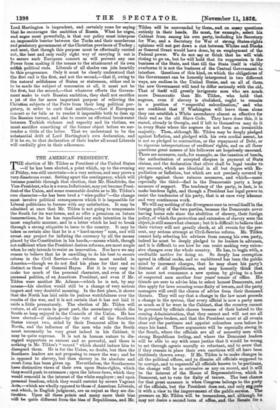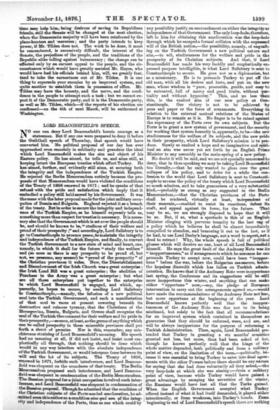AIL AMERICAN PRESIDENCY.
election of Mr. Tilden as President of the United States 1 —if he has been elected, a point which, up to the evening of Friday, was still uncertain—is a very serious, and may prove a very disastrous event. Setting apart the contingency, which will become possible through that election, that Mr. Hendricks, the Vice-President, who is a warm Inflationist, may yet become Presi- dentof the Union, and some reasonable doubts as to Mr. Tilden's own character—he has been bred a "wire-puller"—the change must involve political consequences which it is impossible for Liberals politicians to foresee with any satisfaction.. It may be admitted. at once that Mr. Tilden is not going to compensate the South for its war-losses, and so offer a premium on future insurrections, for he has repudiated any such intention in the most emphatic manner, and in a letter which he had to break through a strong etiquette to issue to the country. It may be taken as certain also that he is a " hard-money ' man, and will arrest any project for inflating the currency by all the means placed by the Constitution in his hands,—means which, though not sufficient when the President desires reforms, are most ample when he only intends to resist an innovation. Nor have we any reason to believe that he is unwilling to do his best to secure reform in the Civil Service—the reform most needed in America—though we do not find his plans for that end so distinct as those of General Hayes. But it is very easy to make too much of the personal character, and even of the personal politics, of an American President, and even if Mr. Tilden were another Mr. Adams—which he is not, by any means.—his election would still be a change of very serious import. and very doubtful meaning. In the first place, it shows that the North has laid aside its jealous watchfulness over the results of the war, and it is not certain that it has not laid it aside a little prematurely. The election of Mr. Tilden will restore, at all events in great part, the ascendancy which the South, so long enjoyed in the Councils of the Union. He has been elected—if elected—by the vote of all the Southern States except two, aided by their Democrat allies in the Northi, and the influence of the men who rule the South must• necessarily be very great indeed in his Cabinet, it may be quite supreme. It is not in human nature to dis- regard supporters so earnest and so powerful, and there is nothing in Mr. Tilden's " record " which should induce him to disregard them. He is for the Union, no doubt, but then the Southern leaders are not proposing to renew the war ; and he is opposed to slavery, but then slavery in its absolute and overt form has been given up. Nevertheless, the Southerners haw distinctive views of their own upon State-rights, which they:would push to extremes ; upon the labour-laws, which they would remould in the interest of the white employer; and upon personal freedom, which they would restrict by-severe Vagrant Acts,—which are wholly opposed to those of American Liberals, and which, in English judgment, are as unjust as they are dis- tinctive. Upon all these points and many more their bias will be quite different from the bias of Republicans, and Mr. Tilden will be surrounded. by them„ and, on many questions- entirely in their hands. He mnst,, fon example, select hia Cabinet from among his own party, including his Secretary. for War, and a Secretary for War of strong States-rights opinions will not put down a riot between, Whites and, Blacks. as General Grant would have done, by, an employment of. the. Federal power. We do not say or think that he will wish. rioting to go on,,but he will hold that its supprPscdon is the business of the State, and that till the State itself is visibly- overborne it is not the business of the Central Government to interfere. Questions of this kind, on. which the obligations of the Government can be honestly interpreted in two different ways, are endless in the United States, and on. all of them the new Government will, tend to differ seriously with the old.. That of itself will greatly invigorate men who are much; more Democratic than Mr. Tilden, who hold that, negroes, even if slavery is abolished, ought to. remain, in a position of "respectful subordination," and who,. areconfident that if Washington will leave them alone-. they can establish a White ascendancy almost as effective for their end as the old Slave Code. They have done this, it is stated, already in Georgia, and if left to themselves may do it in every State where the negroes do not form an irresistible majority, Than, although Mr. Tilden may be deeply pledged against Inflation, and pledged with his own cordial assent,, he is not so pledged to contraction, or the repayment of Debt, or to rigorous interpretations of creditors' rights, and on all these questions great masses of his followers are hopelessly unsound. There are measures, such, for example, as the taxation:of bonds, the authorisation of accepted oheques in payment of State claims, and the declaration that silver shall be legal tender to. any amount, which are identical in all but degree with Re- pudiation or Inflation, but which are not precisely covered by pledges against- those ruinous measures, and which—more especially the third—find in the Democratic party a large measure of support. The tendency of the party,in fact, is to make burdens light, and though a President has legal power to. resist the tendencies of his party, that is at once very irksome and very continuous work.
We will say nothing of the divergence.sure to revealitself in the, foreign polic3r, of the two: parties, because the Demacrats, never having borne rule since the abolition of slavery,,their foreign. policy, of which the protection and extension of slavery were the object, is still somewhat obscure ; but it is difficult to believe that their victory will not greatly check, at all events.for the pre- sent, any serious attempt at Civil-Service reform. Mr. Yilden cannot help selecting his advisers from among his own party, indeed he must be. deeply pledged to its leaders- in advance,, and it is difficult to see how he can resist making very eaten-, sive changes: over the whole country. He has, to begin with,.a creditable motive for doing so. So deeply has corruption spread in official ranks, and so embittered has been the public. mind by incessant charges, that he may share his party's distrust of all Republicans, and may honestly think that_ he must not commence a new system by giving, to a host of suspected men another four years' tenure of office. His friends are sure to advise him to select honest Democrats, and. then apply for laws securing some fixity of tenure, and the party, managers will swell the chorus of' advice from their thousand.. throats. They will say that a change in the law must precede_ a change in the system, that every, official is now a party man as much as if he were in the Cabinet, that the country cannot. be governed by officials chosen because of their hatred to the coming Administration, that they cannot and will not see all their pledges broken, and that the President must at all events clear out the partisans and appoint colourless men before he stays his hand.. These arguments will be especially strong in. the South, where the officials are all of necessity men with strong Republican feeling, and where the Democrat leaders- will be able to say with some justice that it would be wrong• to act through agents morally so reluctant, and to avow that if they remain in place their own exertions will all have been fruitlessly thrown away. If Mr. Tilden is to make changes in all the political offices, and to dismiss all officials supposed to be corrupt, and to supersede.all officials known to be partisans, the change will be as extensive as any on record, and it will be the interest of the House of Representatives, which is Democrat, not to vote for fixity of tenure. The best chance for that great measure is when Congress belongs to the party of the officials, but the President doesnot, and only, suggests it with a view to the improvement of the public service. The pressure on Mr. Tilden will be tremendous, and although he may not desire a second term of office, and the Senate for a time easy help him, being desirous of saving its Republican friends, still the Senate will be changed at the next election, when the Democratic majority will have been reinforced by the place-htmters and waverers ; and the party intends to keep power, if Mr. Tilden does not. The work to be done, it must be remembered, is excessively difficult, the interest of the Senate, the prejudices of the people, and the traditions of the Republic alike telling against bureaucracy ; the change can be effected only by an earnest appeal to the people, and the cir- cumstances -which would have greatly assisted Mr. Hayes, who would have had his officials behind him, will, we greatly fear, tend 'to take the earnestness out of Mr. Tilden. It is one thing to supersede your enemies by an improved system, and quite another to =eartablish them in possession of office. Mr. Tilden may have the honesty, and the nerve, and the confi- dence in the people to attempt such a task ; but we cannot ex- pect it of the Democratic party, and it is the Democratic party, as well as Mr. Tilden, which—if the reports of his election are confirmed—on the 4th of next March, will be enthroned at Washington.

































 Previous page
Previous page